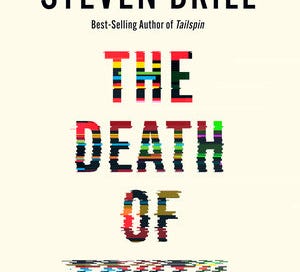The truth crisis: How social media weaponized misinformation
Can we reclaim trust in an age of algorithms and polarization?
By Steven Brill
Grade: 96
In The Death of Truth, Steven Brill tackles a subject close to my heart: how social media has disrupted traditional sources of information, eroded trust in institutions, and created fertile ground for polarization and manipulation. As someone deeply critical of social media’s negative impact on society, I found this book to be a cri de coeur—an impassioned call to action that incisively examines the dangerous intersection of technology and society while highlighting the challenges we face in rebuilding trust in the digital age.
Social media’s role in eroding trust
Brill vividly illustrates how the replacement of local and national news outlets with social media platforms has led to widespread discontent and mistrust of institutions. Traditional journalism, built on editorial standards and rigorous fact-checking, has been displaced by a free-for-all ecosystem where anyone can publish content with no accountability.
This democratization of information, initially celebrated for empowering individuals, has also allowed false narratives to thrive unchecked. Platforms like Facebook and Twitter have sidelined reputable news sources, leaving many to rely on unverified viral posts or sensational headlines designed to elicit emotional reactions. The result is a fragmented audience, where discerning credible information becomes increasingly difficult and skepticism toward media and government institutions grows.
The manipulative power of algorithms
A cornerstone of Brill’s argument is the role of social media algorithms in amplifying the voices of bad actors. These algorithms, designed to maximize engagement, prioritize content that provokes strong emotions like anger, fear, or outrage. This creates echo chambers where users are fed increasingly extreme content that aligns with their biases, making misinformation spread more easily and widely.
One example Brill provides is the proliferation of conspiracy theories about election fraud. Social media platforms amplified these lies, enabling them to reach millions. The result was not just public confusion but tangible harm, as misinformation fueled distrust in democratic institutions and led to real-world consequences.
Georgia election officials’ lives ruined over lies
Brill recounts the heartbreaking story of Ruby Freeman and her daughter Wandrea “Shaye” Moss, election officials in Georgia who became targets of a relentless harassment campaign by election deniers. Social media amplified false claims accusing them of tampering with ballots during the 2020 election, leading to death threats, doxing, and severe personal strain.
Their ordeal is a stark example of how misinformation can destroy lives and undermine public trust.
Brill succinctly captures the broader implications of these attacks, stating that social media platforms give “fringe politicians and their allies...mass scale misinformation weapons to lead the vulnerable down paths they might otherwise not have followed.”
Social media and the Capital riots
One of the book’s most sobering chapters explores how social media played a pivotal role in enabling the January 6 Capitol riots. Brill details how extremist groups used platforms to recruit, organize, and amplify their messages. Facebook groups, Twitter threads, and Parler posts were rife with calls to action, providing a roadmap for the mob that stormed the Capitol.
For example, hashtags like #StopTheSteal gained massive traction in the weeks leading up to the attack, with millions of shares fueling a shared delusion among participants. Brill connects these online activities directly to the real-world violence that ensued, making a compelling case for stricter accountability from social media platforms.
The book also shares the story of a young, unemployed man who became swept up in the online rhetoric. Feeling emboldened by the content he consumed on platforms like Facebook, he joined the Capitol riots, a decision that ultimately landed him in prison.
In hindsight, he lamented, “If I didn’t have Facebook, I would have done a whole lot better, and I probably wouldn’t have been...motivated to engage in some of the behavior that I did.”
The human cost of misinformation
What I find most troubling about social media is the megaphone it provides to bad actors—politicians, demagogues, and conspiracy theorists—whose only goals are popularity and power. These individuals wield significant influence, and their false claims often have tragic consequences.
One example Brill shares is that of a doctor whose COVID-19 patients refused treatment because they had heard online that the vaccines were unsafe. One patient, even on his deathbed, believed it was "just a cold."
These stories illustrate how misinformation, amplified by social media, has not only eroded trust but also cost lives.
A book worth reading
While I don’t consider every book I read to be essential reading for everyone, I firmly believe The Death of Truth is an exception. Brill masterfully connects the dots between the erosion of traditional news, the manipulative power of algorithms, and the devastating consequences of misinformation.
This book serves as both a warning and a call to action: we must advocate for more responsible digital platforms and work toward restoring trustworthy sources of information. For anyone concerned about the future of truth in the digital age, The Death of Truth is an indispensable read. I really, really enjoyed it, and so will you.




